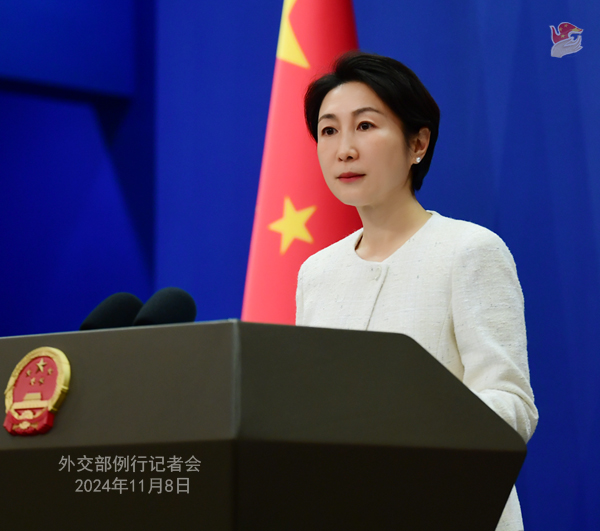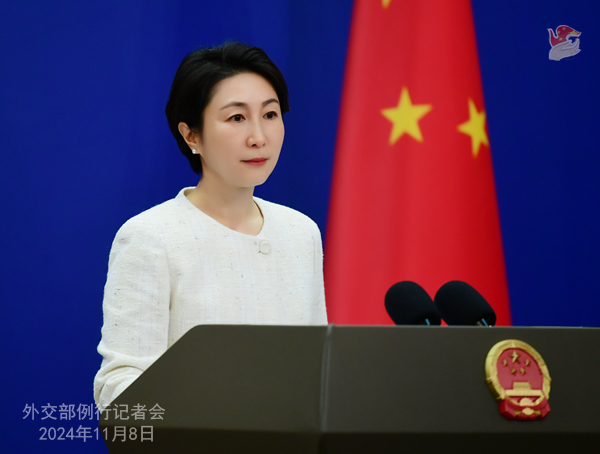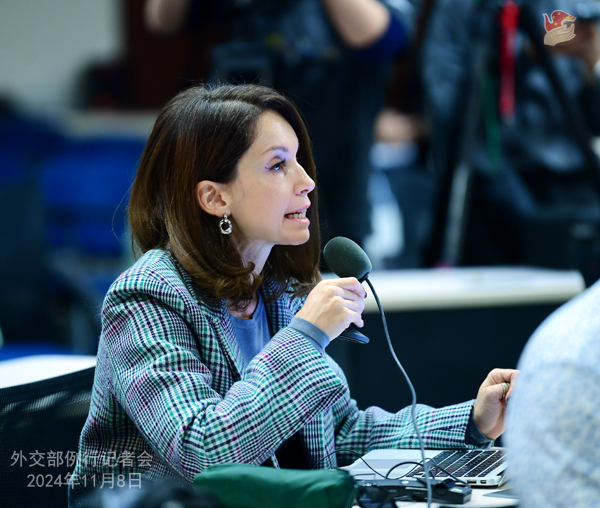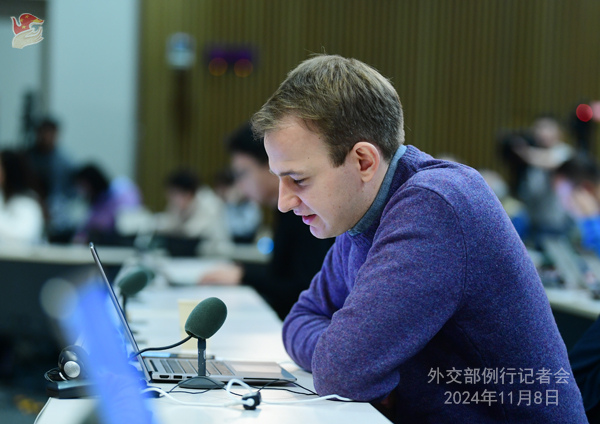
At the invitation of Deputy Prime Minister of Singapore Gan Kim Yong, Member of the Standing Committee of the Political Bureau of the CPC Central Committee and Vice Premier of the State Council Ding Xuexiang will visit Singapore from November 10 to 11, and co-chair with Deputy Prime Minister Gan Kim Yong the 20th meeting of the China-Singapore Joint Council for Bilateral Cooperation, the 25th meeting of the China-Singapore Suzhou Industrial Park Joint Steering Council, the 16th meeting of the China-Singapore Tianjin Eco-City Joint Steering Council, and the eighth meeting of the China-Singapore (Chongqing) Demonstration Initiative on Strategic Connectivity Joint Steering Council.
At the invitation of President of Azerbaijan Ilham Aliyev, President Xi Jinping’s Special Representative, Member of the Standing Committee of the Political Bureau of the CPC Central Committee and Vice Premier of the State Council Ding Xuexiang will travel to Azerbaijan from November 12 to 13 for the World Leaders Climate Action Summit and visit Azerbaijan at the invitation of Deputy Prime Minister of Azerbaijan Shahin Abdulla oglu Mustafayev.
CCTV: Could you share with us China’s expectations for the 31st APEC Economic Leaders’ Meeting and the 19th G20 Summit? What message does China hope to send to the world at these meetings?
Mao Ning: President Xi Jinping’s attendance at this year’s APEC Economic Leaders’ Meeting is an important move of China’s heads-of-state diplomacy facing the Asia-Pacific, which fully shows the high importance China attaches to Asia-Pacific economic cooperation. In a world struggling to find drivers for growth, regional economic cooperation in the Asia-Pacific faces new challenges. APEC is an important platform for economic cooperation in the Asia-Pacific, and this region is expected to continue to play its role as a dynamic engine for world economic growth. President Xi Jinping will deliver an important speech at the meeting to elaborate on China’s important measures to deepen reform and opening up and propositions on advancing Asia-Pacific cooperation. China stands ready to work with other parties to deliver on the APEC Putrajaya Vision 2040 in an all-round and balanced way, strive for positive outcomes of this meeting, provide new impetus for advancing regional economic integration and promoting the growth of Asia-Pacific and the rest of the world, and jointly build an Asia-Pacific community with a shared future.
President Xi Jinping’s attendance at the G20 Summit demonstrates China’s staunch support for multilateralism and the high importance it attaches to G20 cooperation. In a world fraught with sluggish economic growth, challenges in development and increasing uncertainties and instability, it is a widely shared expectation that the G20 will play its role as the premier forum for international economic cooperation, provide a driving force for world economic growth and guide the way forward for improving global economic governance. President Xi Jinping will deliver an important speech at the meeting and have an in-depth exchange of views with leaders of other countries under the theme of “Building a just world and a sustainable planet.” China champions an equal and orderly multipolar world and a universally beneficial and inclusive economic globalization, and stands ready to work with other parties to strive for positive outcomes and send out clear-cut messages of the Rio de Janeiro Summit in upholding multilateralism, building an open world economy and supporting sustainable development, and help countries to join hands in addressing challenges, achieving common prosperity and building a community with a shared future for mankind.
CGTN: On the state visits by President Xi Jinping to Peru and Brazil, can you share the main program and China’s expectation for China-Peru and China-Brazil relations?
Mao Ning: Peru is an important country in Latin America. China and Peru are comprehensive strategic partners. Over the past 53 years of diplomatic ties, China and Peru have consolidated political mutual trust, achieved fruitful outcomes in Belt and Road cooperation, and deepened cultural and people-to-people exchanges, bringing tangible benefits to the peoples of the two countries. Since last year, President Xi Jinping and President Dina Ercilia Boluarte Zegarra have met twice to draw a new blueprint for the growth of bilateral relations.
This is President Xi Jinping’s second visit to Peru in eight years. During the visit, President Xi Jinping will hold talks with President Dina Ercilia Boluarte Zegarra for an in-depth exchange of views on bilateral relations and cooperation in priority areas. He will also attend state events including the welcoming ceremony, the ceremony to exchange cooperation documents, and the welcoming banquet, as well as other side events. We believe that President Xi Jinping’s visit will further consolidate political mutual trust, deepen practical cooperation in various areas, and achieve more positive outcomes in the China-Peru comprehensive strategic partnership for the benefit of the peoples of the two countries.
China and Brazil are the biggest developing country respectively in the Eastern and Western Hemisphere. The two countries are both important emerging economies and comprehensive strategic partners. This year marks the 50th anniversary of China-Brazil diplomatic relations. Over the past half a century, amid the changing international landscape, the two countries have maintained sound and steady development of bilateral ties, achieved fruitful outcomes in practical cooperation in various areas, and set an example of major developing countries pursuing common development in solidarity and cooperation. The overall, strategic and global significance of the bilateral relations has continued to improve. In April last year, President of Brazil Lula da Silva paid a successful state visit to China, and the two presidents reached a number of important common understandings on guiding and opening up new prospects of China-Brazil relations in the new era.
This is President Xi Jinping’s second visit to Brazil in five years. President Xi Jinping will have talks with President Lula da Silva for an in-depth exchange of views on bilateral relations and international and regional issues of mutual interest. He will also attend state events, including the welcoming ceremony, the signing ceremony of cooperation documents, the joint meeting with the press, and the welcoming banquet. We believe President Xi Jinping’s visit will further consolidate political mutual trust, improve the strategic significance, innovative nature and leading role of the bilateral relations, enhance synergy between the two countries’ development strategies, deepen strategic communication and coordination on global hotspot issues, and jointly open up the next golden 50 years of China-Brazil relations.

Reuters: Please could you tell us whether President Xi will meet with US President Biden at, I believe, APEC or G20 summits?
Mao Ning: I have no information to share.
AFP: On tariffs, specifically about former treasury secretary Steven Mnuchin who said in an interview yesterday that tariffs are needed to be used, especially with regard to China, essentially saying that he would recommend using tariffs against China. Does China have a response to this?
Mao Ning: I’d refer you to competent Chinese authorities for specifics. More broadly, let me reiterate that there is no winner in a trade war, nor will the world benefit from it.
RIA Novosti: Russian President Vladimir Putin said yesterday that the US is pursuing a policy of dual containment, trying to contain both China and Russia, but if the US changes its vector towards Moscow and Beijing, everyone will benefit. He also added that Russia supports China because it pursues a restrained policy and because it is Russia’s ally. What’s China’s comment on these statements?
Mao Ning: China and Russia are each other’s comprehensive strategic partners of coordination for a new era. The two sides as always grow bilateral relations and carry out cooperation across the board based on the principle of non-alliance, non-confrontation and not targeting any third party.
China always believes that major-country competition runs counter to the trend of the times, and containment and suppression as well as bloc confrontation will win no support. Mutual respect and win-win cooperation is the right way for countries to get along with each other.
China Daily: You just announced that Vice Premier Ding Xuexiang will, as the special representative of President Xi Jinping, travel to Azerbaijan to attend the World Leaders Climate Action Summit and visit the country. Could you share more information with us on that?
Mao Ning: Azerbaijan, the host of the 29th Conference of the Parties on Climate Change (COP 29) in Baku, will hold the World Leaders Climate Action Summit. The main task of COP29 is to set a global climate finance goal after 2025 and make preparations for the submission of a new round of Nationally Determined Contributions (NDCs), which is of great importance to advancing global climate governance. Vice Premier Ding Xuexiang will attend the summit as the special representative of President Xi Jinping.
China stands ready to work with other parties to uphold the goal, principles and system of the UN Framework Convention on Climate Change (UNFCCC) and the Paris Agreement, advance practical actions and achieve sustainable development. China hopes to see positive outcomes on the global climate finance goal at the meeting. Developed countries should earnestly fulfill their responsibilities and provide strong financial support to developing countries for their climate response. China will continue to offer assistance to fellow developing countries to the best of its capacity under the framework of South-South cooperation.
China and Azerbaijan are good friends with sincerity and mutual trust, and good partners based on equality and mutual benefit. In July this year, President Xi Jinping met with President Ilham Aliyev on the sidelines of the Astana summit of the Shanghai Cooperation Organization (SCO), and the two sides jointly announced the decision to elevate the bilateral relations to a strategic partnership, which has opened a new chapter for the growth of the relations between China and Azerbaijan. During Vice Premier Ding Xuexiang’s visit, he will hold talks with Deputy Prime Minister Shahin Abdulla oglu Mustafayev and the two sides will have an in-depth exchange of views on bilateral relations and cooperation across the board. We believe that this visit will further move forward the China-Azerbaijan relationship and bring more benefits to the two peoples.
AFP: German prosecutors said yesterday that they had arrested an American citizen for allegedly offering to spy for China on US military institutions in Germany. Is China aware of this case and do you have a comment?
Mao Ning: I am not aware of what you mentioned.
The Paper: China just announced that Vice Premier Ding Xuexiang will visit Singapore and chair the China-Singapore bilateral cooperation mechanism meetings. Could you share more information with us?
Mao Ning: China and Singapore are friendly neighbors and important cooperation partners, and the two countries elevated bilateral relations to an all-round high-quality future-oriented partnership last year. The China-Singapore bilateral cooperation mechanism meetings are the highest platform of mechanisms to coordinate cooperation between the two countries, which play an important role in deepening bilateral cooperation and advancing bilateral relations.
During Vice Premier Ding’s visit, he will have in-depth exchanges with the leaders of Singapore on bilateral relations and issues of mutual interest, and co-chair the China-Singapore bilateral cooperation mechanism meetings with Deputy Prime Minister Gan Kim Yong. China stands ready to work with Singapore and take this visit and the mechanism meetings as an opportunity to strengthen strategic communication, deepen and expand cooperation across the board, deliver more benefits for the two peoples and promote regional prosperity and development.

Reuters: Does China have any comment on Russian President Vladimir Putin saying he would be open to resuming talks with US President-elect Donald Trump and that Trump’s comments on Ukraine “warrant attention?”
Mao Ning: The relationship between Russia and the US is a matter between the two countries.
On the Ukraine crisis, China’s position is consistent. We support all efforts that are conducive to the political settlement of the crisis.
AFP: I have a question on AstraZeneca. Over the last couple of days, the company has said that its president has been detained in China. Can you provide any more information on this case?
Mao Ning: I am not familiar with the specifics. I’d refer you to competent authorities.
AFP: Taiwan’s coast guard today said that it would be giving people cash rewards for reporting the presence of foreign military ships in its waters and they included the PRC ships in that. Does China have a comment on this new policy?
Mao Ning: This is not a question about foreign affairs.
China News Service: It’s reported that the Philippines officially signed the “Philippine Maritime Zones Act” and the “Philippine Archipelagic Sea Lanes Act” into law. What’s China’s comment?
Mao Ning: The Ministry of Foreign Affairs of China has issued a statement on the Philippines signing into law the so-called “Maritime Zones Act” and “Archipelagic Sea Lanes Act,” and summoned the Philippine Ambassador to China to make serious protests.
Let me stress that the so-called “Philippine Maritime Zones Act” illegally includes China’s Huangyan Dao and most of the islands and reefs of China’s Nansha Qundao, and their relevant waters into the Philippines’ maritime zones. The act also aims to further solidify the illegal arbitral award on the South China Sea in the form of domestic legislation. This move severely violates China’s territorial sovereignty and maritime rights and interests in the South China Sea. We strongly condemn and firmly oppose it.
China’s territorial sovereignty and maritime rights and interests in the South China Sea are solidly grounded in history and the law, comply with international law including the United Nations Convention on the Law of the Sea (UNCLOS), and will not be affected by the “Philippines Maritime Zones Act.” The so-called arbitral award on the South China Sea is illegal, null and void. China does not accept or recognize it. We oppose and do not accept any claim or action based on the award.
The Philippines seeks to justify its illegal claims and actions in the South China Sea by approving the so-called “Maritime Zones Act” in the name of implementing UNCLOS. This is illegal, null and void. This so-called legislation seriously violates the Declaration on the Conduct of Parties in the South China Sea and will make the situation in the South China Sea more complex. China will firmly oppose any infringement activities and provocations by the Philippines in the South China Sea based on the act.
China urges the Philippines to earnestly respect China’s territorial sovereignty and maritime rights and interests, immediately end any unilateral move that may escalate the dispute and complicate the situation, and keep the South China Sea peaceful and stable. China reserves the right of taking all measures necessary.
Various parts of the Philippine “Archipelagic Sea Lanes Act” are not compatible with regulations of international law and resolutions of the International Maritime Organization. We ask the Philippines to earnestly abide by international law and not to undermine other countries’ lawful rights under UNCLOS and other international law.
